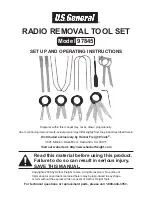
12
I
I
.
.
P
P
R
R
E
E
S
S
E
E
N
N
T
T
A
A
T
T
I
I
O
O
N
N
1
1
.
.
G
G
e
e
n
n
e
e
r
r
a
a
l
l
§
§
The OLCT80 is an analogue/digital transmitter designed for gas detection. It can be installed and addressed in
a network or connected to any acquisition system managing an analogue signal (0 to 20 mA).
§
§
The OLCT80 comprises a transmitter (electronic section) and an integrated or remote sensor on the version
OLCT80D.
§
§
It has integrated alarms allowing it to be used as a stand-alone measurement unit, even in ATEX-classified
potentially explosive zones (see Chapter VII).
§
§
In a zone classified as potentially explosive,
the OLCT80 can be used as a s tand-alone measurement unit.
§
§
An intrinsically safe remote control unit is used for non-intrusive dialogue with the transmitter during
maintenance or configuration operations.
§
§
The OLCT80 can be used as a digital repeater on the network (up to a maximum of 3) when it is installation in
loop configuration. The maximum length of the loop in this case is 4.8 km.
§
§
It has two auxiliary analogue inputs allowing the connection of two additional detectors of any type (gas,
flame, temperature, pressure, etc.), provided that they deliver a 4 -20 mA analogue signal (Fig. 5).
§
§
It feeds two alarm contacts and a technical fault contact (2A/250VAC, potential-free).
•
•
The relays are actuated:
−
−
By the OLCT80 itself using the programmed alarm thresholds,
−
−
And/or by the MX62 central unit if the OLCT80 is connected to it.
I
I
I
I
.
.
I
I
N
N
S
S
T
T
A
A
L
L
L
L
A
A
T
T
I
I
O
O
N
N
CAUTION:
First refer to the Paragraph "Marking and Special Instructions for Installation in Explosive
Atmospheres".
1
1
.
.
M
M
e
e
c
c
h
h
a
a
n
n
i
i
c
c
a
a
l
l
i
i
n
n
s
s
t
t
a
a
l
l
l
l
a
a
t
t
i
i
o
o
n
n
§
Observe the precautions described above.
§
Check the overall dimensions of the detector in situ: see Fig. 2 or 3
§
Secure the detector: see figures below:
-
FIG. 2
: Version with integrated detector;
-
FIG. 3
: Version with remote infrared detector
-
FIG. 4
: Version with remote detector.
Note: For the OLCT80 with integrated detector, the nose piece must always point downwards.
2
2
.
.
E
E
l
l
e
e
c
c
t
t
r
r
i
i
c
c
a
a
l
l
i
i
n
n
s
s
t
t
a
a
l
l
l
l
a
a
t
t
i
i
o
o
n
n
Carry out installation in compliance with the prevailing standards and classification of the zone.
To ensure that the detector operates correctly, the cable resistance must remain within the limits specified in the
technical characteristics table for the measurement unit connected and the OLCT80 transmitter.












































